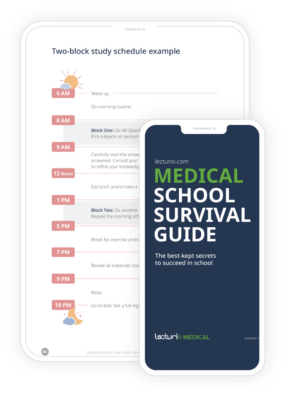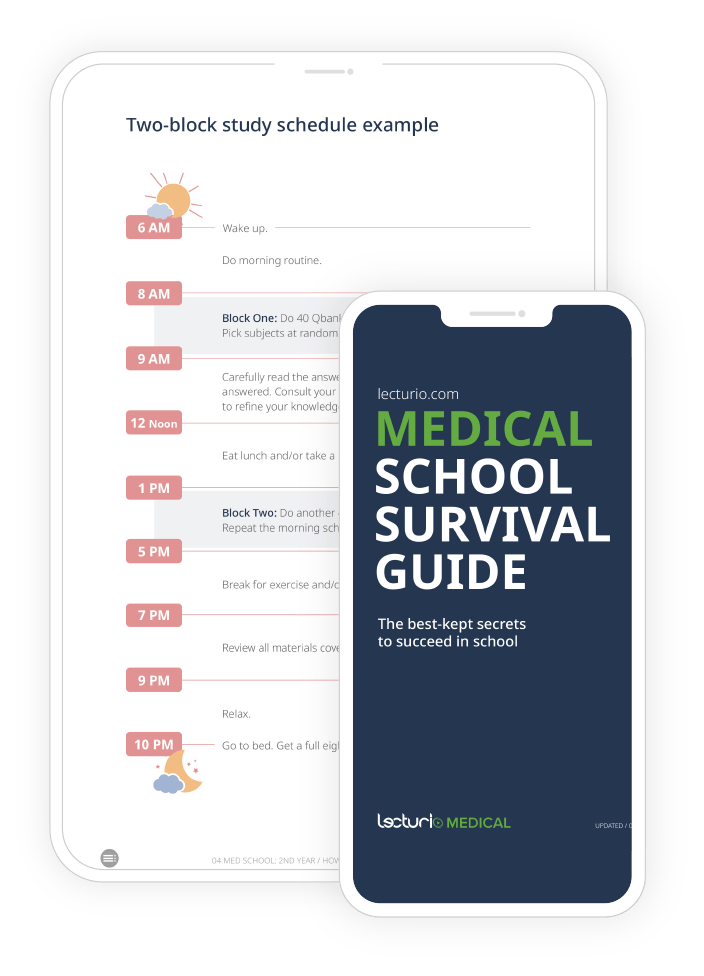On my first day of medical school, we were told that “medical school is a marathon, not a sprint.” It’s a long, taxing process to become a doctor, and with good reason. One day, someone will put their life in your hands and you’ll have to know what to do next. The pressure will bear down heavier than any book that you’ve read and any exam you’ve taken. But before that day comes, you study and practice day in and day out.
Part of the status that comes with medical school is how hard it is. A meta-analysis of medical students around the globe showed that depressive symptoms were higher among medical students than the United States’ general population. A global study showed that anxiety had a prevalence rate of 33.8% in medical students. So how did it come to this? What makes med school so stressful?
Sources of Medical School Stress
Medical school can be stressful for a variety of reasons. But not all these reasons are the same for everyone. Some people can easily handle the increased workload. Some can easily carry the emotional baggage. It can look like some people are doing well. Then it turns out they’re the ones suffering the most.
How stressful is medical school?
As a medical student, you were likely at the top of your class most of your academic life. You entered wide-eyed, ready for another challenge. But when you’re placed in an environment in which everyone is at least on the same level as you, it feels like you weren’t that smart after all. Suddenly you have these stacks of readings for the exam in a few days. With so much information to study in too little time, all your effort is focused on passing while your non-med friends are earning their salaries, getting married, and traveling. Meanwhile, your classmates seem to be doing just fine. So why is it so hard for you?
Even after all that hard work, the day of the exam comes around and maybe you fail. It becomes disheartening to work for so much with little reward. But you don’t have time to wallow because the next exam is coming up, and it has more content than the last! You suck it up and keep going because you can’t afford to fail. This goes on for 2-3 years in the classroom, and then you need to balance it with hospital work.
How stressful are hospital rotations?
The first thing you need to learn about hospital rotations is that medical students are the lowest on the food chain. This means you may get scolded or be asked to do work that no one else wants to do. You’ll be working 36-hour shifts with minimal rest and running after your residents who are on duty with you.
The hospital is where you get to see the field of medicine at its worst – and at its best. I once talked to a schizophrenic man while working in a psychiatric ward. I listened to how his diagnosis debilitated him. His voice broke as he talked about how it separated him from his family for years. But his tone lit up as he told me how his treatment let him walk in public again. The voices stopped, he started attending church across the street, and he could talk to people normally again. He was my first patient ever.
The shifting of emotions can be overwhelming. Fatigue, happiness, sadness, fear, and anger can all happen in the span of an hour. That in itself can be tiring. But it’s worth it because you get to see your patients’ faces, learn their stories, and understand the person beyond the diseases in your books. There are some lessons that can’t be learned in the classroom.
At the end of the day, you may wonder if you were really made for this, asking yourself if this is how hospital work will be like. It is a mix of good and bad days. So if you forget to take care of yourself, you might find yourself burned out one day.
What is Medical Student Burnout?
Burnout is exactly what it sounds like. You’ve burned all your mental and emotional energy stores until you were out. This is not something exclusive to medical school, but it is very common. A narrative review of MEDLINE articles across medical schools from the years 1990 to 2015 showed that 35–45 percent of medical students had high emotional exhaustion, and 45–56 percent of medical students had at least one symptom of burnout.
Some people don’t know they’re experiencing burnout until it has already affected their lives and performance. Being able to identify the symptoms early can help you avoid more severe outcomes. The most common signs include, but are not limited to:
- Avoiding work-related tasks. Does reviewing your books and notes feel more daunting than before? Do you procrastinate a lot before studying, even though there’s an upcoming exam? Do you avoid going to school at all?
- Reduced performance. Are your grades dropping? Is it getting harder to absorb information? Are you having a hard time with subjects that used to be fun?
- Physical symptoms. Are you having headaches? Do you feel more tired than normal? Are you getting sick more often?
- Emotional exhaustion. Do you lack the energy to work? Do you feel less fulfilled and motivated? Are you having mood swings?
What happens during burnout?
The effects of burnout may start in med school, but it can leak into your personal life as well. Studies show that burnout can affect your well-being to the point of depression and suicidal ideation. Your grades might drop, or your friends and family might say you’ve been acting differently. I’ve seen people completely isolate themselves and snap at people they care about because of burnout.
It can also start affecting your work at the hospital. There are studies showing that burnout is related to increased medical errors that cause harm to patients and impede the quality of care these patients deserve. Students with burnout also have lower levels of empathy, resulting in lower quality of care.
You can’t treat your patients with kindness and compassion when you have none for yourself.
What can I do about medical student burnout?
Preventing Medical Student Burnout is easier said than done. Even if you can’t, that’s fine. As long as you make an active effort to take care of yourself, you’ll be in a better place than before. Your lifestyle in med school should be a configuration of your academic and personal needs. So here are some tips to help balance the two:
- Take breaks to do things you like. There’s more to you than just being a med student. Some of us are artists, writers, and athletes. We had hobbies that made us who we are before we entered med school and allowing time for these things really makes a difference. You can even use this time to rest, meditate, or just relax.
- Have a change of pace. Working in your room can get monotonous. Rearrange your furniture. Study in a café or the library, when it’s possible. Get some plants. Study with a friend online. You may find it refreshing to see new things and having things to look forward to.
- Get more sleep. It’s hard to balance sleep with studying and free time. Time management plays a big role here. It really helps to make a planner or to-do list so that by the time you finish your work, you’ll have time to sleep!
- School activities. Like any school, med school has organizations, school events, and recreational facilities. There’s a whole student life out there for you to explore to make your med school experience more colorful. Who knows, you might even make new friends along the way!
- Reach out to friends and family. Many med students isolate themselves when studying. But how about taking a break to connect with the people you care about? Friends and family are there to listen to your anxieties and comfort you through hard times. It helps to know that you’re not alone on this journey.
- Talk to a mental health professional. You might also want to talk to someone trained to help with problems like this. You might think there’s no time to see a professional, but it might take more time figuring things out on your own. There is also no wrong time to consult with a professional, even if things are going well. These people likely also know firsthand what you’re going through!
- Remind yourself about why you’re here. It sounds cheesy, but it’s true. Your reason for wanting to be a doctor can help keep you focused on your final goal. The mantra “always remember your ‘why’” has gotten me through my toughest days because it reminded me that my hardships would be worth it.
What is Medical School Syndrome?
Another common mental health issue in medical school is Medical School Syndrome. No, it’s not getting sick of medical school, but there should be a term for that. Medical School Syndrome is when students start thinking they might have the same diseases they learned about in class.
A student learning about lung cancer might think something is wrong when they start coughing. Lectures about enlarged lymph nodes may have some students reaching for their neck, checking for movable bumps. People with Medical School Syndrome will see doctors repeatedly for their concerns, despite being told they’re not sick.
This type of hypochondriasis likely comes from stress. We can become so exhausted that we feel unwell and start thinking maybe we’re sick with cancer or some rare disease. If you feel these symptoms, it might be time to visit a mental health professional.
Why Don’t Medical Students Seek Help?
Did you know that med students are three times more likely to die due to suicide than their counterparts in the general US population? Yet only 15.7 percent of students seek help for their problems. Why is that?
Medical students are overworked as it is. We don’t have time to sleep, much less see a mental health professional. Even if we did have time, a large barrier is the culture. Everyone is too busy trying to keep themselves afloat to help other people. Because of this, it’s easy to shrug off actual mental problems while saying things like “It’s medical school. What were you expecting?”, “You signed up for this”, and “That’s nothing! Last night I drank 15 cups of coffee, didn’t sleep, and now I can hear colors!”
All jokes aside, there is a stigma toward mental health problems. How will patients react to a doctor with mental health problems? Why can my classmates handle med school, but I can’t? These are valid concerns, and exactly why mental health needs more attention. The least we can do is lend a hand to our classmates having a hard time. Send a care package, message them, or ask them how you can help.
If we don’t look out for each other, who will?
A Final Word
It’s true that medical education needs to change. But it needs to start with the incoming generation of doctors who want it to change. We need to practice caring for ourselves and each other to promote a new culture of kindness and compassion for future students and patients. They deserve better. We deserved better. After everything, I hope the doctor you become is the role model you needed when you were a medical student.

Take the Course: Psychiatry
Cover all psychiatry essentials with Dr. Helen Farrell from Harvard Medical School.







